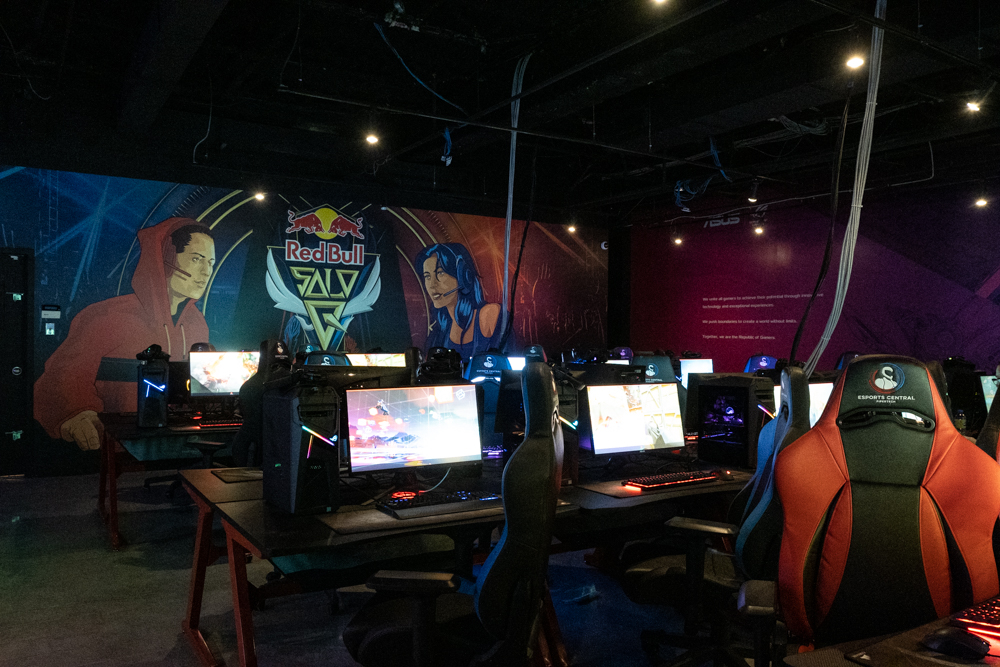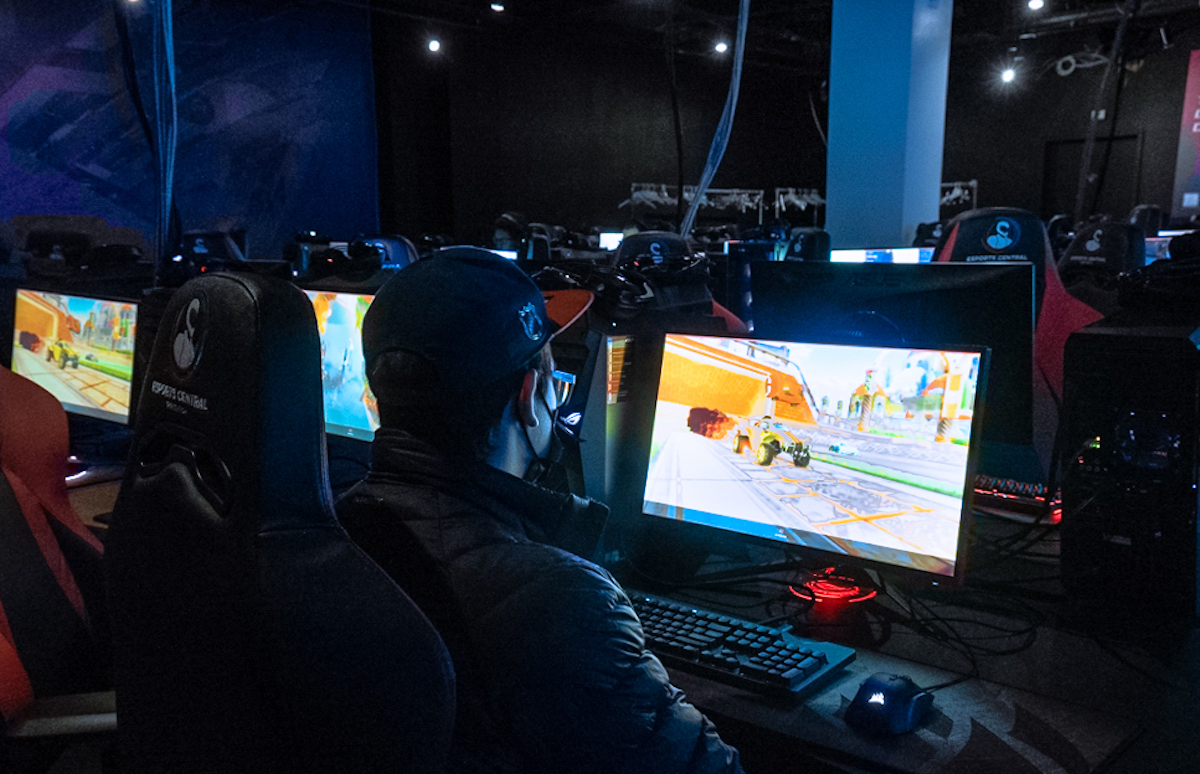Montreal’s esports scene is growing, with the city finding its place in collegiate esports, international esports events, and the welcoming of gamer-oriented spaces such as the Montreal Esports Academy and Esports Central
Montreal is home to many outposts of game development companies such as Ubisoft, Bethesda, and Electronic Arts. While game development itself might be ingrained in the city, its esports scene is still developing. Dimitri Kontogiannos, a graphic designer, founding member of the Concordia Esports Association, and vice president of the Quebec Esports Federation believes the best has yet to come. “I think there’s a difference in game philosophy and the type of game developers we have in Montreal. If we look at games traditionally Montreal developers have put forward […] they’re really games that come out year-to-year.”
Even with its history in game development, the city’s gaming scene is still somewhat split into two worlds. The story-based games that Montreal’s developers usually put out often don’t match with the esports model, where games are designed purely for online competition and updated regularly by the developers.
“Your League of Legends, your Counter-Strikes, they’re really games that have been supported long term by the dev […] Montreal developers weren’t really leaning towards that style of game creation,” Kontogiannos explained.
There are some exceptions. Notably, Ubisoft’s Rainbow Six Siege has amassed a huge esports following since its conception, with four participating leagues in Europe, North America, Latin America, and the Asia-Pacific region. Montreal is home to the game’s Six Invitational, a yearly international tournament where teams compete for a prize pool of up to 3 million dollars. After being set in Paris for 2021, the invitational was supposed to return to its home city of Montreal in 2022. Unfortunately, due to Quebec’s stringent COVID-19 restrictions earlier this year, the tournament was again relocated to Stockholm, Sweden, where it was held in February.
DreamHack is one of the world’s biggest LAN events that tours the globe, offering different competitions and experiences at each destination. Montreal was DreamHack’s Canadian destination between 2016-2019, but was unfortunately canceled in 2020 and 2021 due to Covid-19. Dreamhack is also not scheduled to come to Montreal for its 2022 season. Only time will tell if the LAN will eventually return to the city, but Montreal’s gamers will surely be ready for it.
While these events are pillars of Montreal’s involvement in esports, where the city shines is its collegiate scene. “It was really impressive when we had multiple universities next to each other that competed in esports […] they’re all downtown and within walking distance of each other,” said Kontogiannos, who’s seen the rise of Montreal’s collegiate scene since its beginnings. “That was kind of a lot of fun to play with when we’re organizing collegiate events or grassroots events or even local bars or LAN centres.”
Matisse Fortier, otherwise known as “Oracle”, is a player for Concordia’s collegiate League of Legends Team. “The competition is really fun. I like feeling the adrenaline of playing an intense match,” said Fortier. The team plays in the CSL Esports league, in which they battle against other collegiate teams across North America for a prize pool of $10,000. Throughout a season of six weeks, teams go face-to-face weekly in a best of three format until the top contenders progress to the playoffs. Fortier is currently in his second season playing for Concordia’s League of Legends team, who are currently in the playoffs. “I have been doing tournaments for a while, I think it’s always been a good way to meet people who have similar interests as me,” he remarked. “It’s the way the game is meant to be played.”
With the help of Montreal Esports Academy, high schoolers are also getting their esports fix in an environment that encourages a healthy, balanced lifestyle. According to their website, the academy is an extension of Canada Esports Academy, and is partnered with three high schools in Montreal who incorporate esports into their academic experience. Students enrolled in the Montreal Esports Academy’s program get professional coaching on various games and are surrounded by like-minded students striving to compete.
“We try to teach people that esports isn’t a bad thing,” said Helmrich Vogt, the academy’s head of business development and administration. Helmrich said that the academy’s program helps the student’s mental and physical health through mandatory exercises. Vogt explained that the academy’s emphasis on health helps to ensure that the students don’t only focus on being better gamers, they are also taught using a multi-faceted approach to esports training that will give them “more energy”, and can even help to “improve their reaction time” in game,. With the program, “a lot of the students are more motivated to go to school,” he remarked.

In 2019, a new home for Montreal’s gamers and esports enthusiasts was born, Esports Central. The establishment takes its own twist on the traditional “gaming café,” offering both state of the art gaming facilities and a bar environment. The complex has received partnerships with Redbull where they held a part of Redbull’s Player One tournament. Esports Central hosted Canada’s Player One qualifiers in 2019, in which the top players would go on to compete internationally, according to Redbull’s official website.
The facility is equipped with top of the line PCs, racing simulators, groups of friends can even rent out a couch station to play together on the latest consoles. While some gamers prefer climbing leaderboards, others prefer a chill, social environment where they can just have fun. Esports Central provides a space for both, making it a gaming hotspot for “tryhards” and “casuals” alike.
Esports has taken the globe by storm. According to an article by Statista, esports market revenue worldwide is predicted to increase to 1.62 billion USD by 2024, a large increase from 2021’s projection of 1.08 billion. While the market is rising worldwide, Asia dominates the scene. Asian viewers are predicted to make up “50 per cent of more than 1 billion esports and game viewers by 2025,” according to an article by GreenBook. And it’s not just the viewers. Teams from Asia are known within esports for their notorious skill compared to teams from other regions.
“I think, honestly, it might just be a pure numbers game,” said Kontogiannos. “That’s what happens when you have a billion people,” he said jokingly regarding China specifically. “Your player base is so much bigger down there.”
While Montreal’s esports scene is still in development, the future looks bright. With a sprawling collegiate scene and the city’s embrace of esports through Esports Central and staple events like DreamHack Canada, there is still more room for growth as the esports market continues to boom. “I also maybe see one of these world finals type of events for League of Legends or even a CS:GO major potentially in Montreal,” stated Kontogiannos, arguing that the city’s facilities are more than capable of hosting a major esports event. “The main criteria these guys look for […] is transport, hotels, distance to venue, and […] international airports, and Montreal has all those.”
The groundwork for Montreal’s esports scene has been set. With the city slowly coming back to life after heavy COVID-19 restrictions, we’ll have to wait and see how esports continues to manifest itself into Montreal’s entertainment and sports cultures. Although, with the rising growth of esports worldwide, there is no doubt that the city’s esports landscape will continue to follow the trend.
Photos by Kaitlynn Rodney




